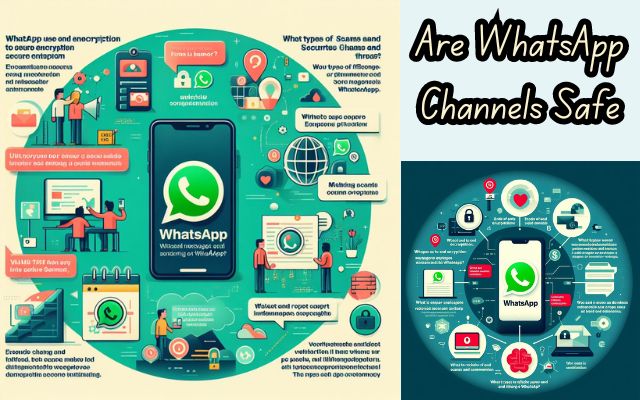Are WhatsApp Channels Safe? Secure Messaging

Are WhatsApp Channels Safe? This is a question that has been on the minds of many in the digital age. As we increasingly rely on online platforms for communication, the safety of these platforms becomes paramount.
WhatsApp, a popular messaging app, introduced channels as a way to facilitate group communication. These channels have become a common tool for businesses, communities, and individuals alike. But with this widespread use, concerns about safety have inevitably arisen.
In this article, we will delve into the safety aspects of WhatsApp Channels. We will explore their key features, discuss potential risks, and provide tips for safe usage. Our aim is to provide a comprehensive understanding of whether WhatsApp Channels are indeed safe, and how users can ensure their security while using this platform.
Stay tuned as we unravel the intricacies of WhatsApp Channels and their safety features, and address the burning question: Are WhatsApp Channels Safe? Let’s dive in!
Understanding WhatsApp Channels
WhatsApp Channels, a recent addition to the popular messaging app, serve as a one-way broadcast tool for admins and content creators. These channels allow admins to send text, photos, videos, stickers, and even polls. This feature has become an effective means for disseminating information, updates, and multimedia content to a select audience.
The unique aspect of WhatsApp Channels is that they maintain the confidentiality of user contact information. This means that whether you’re an admin or a follower, your phone number and profile photo won’t be shown to the other party. This feature enhances the privacy of users and makes WhatsApp Channels a more secure platform for communication.
To make it easier for users to find channels that interest them, WhatsApp has built a searchable directory. This directory allows users to find channels based on their hobbies, sports teams, updates from local officials, and more. Additionally, channel admins can share a link outside of WhatsApp to help people find their channel.
WhatsApp Channels are not just for individuals. They can also be created by organizations. This makes them a versatile tool for communication, catering to a wide range of users.
However, it’s important to note that WhatsApp Channels are still being rolled out and aren’t available to everyone yet. New features are being introduced gradually, and some, like the ability to create a channel, might not be available to all users yet.
Safety Features of WhatsApp Channels
WhatsApp Channels prioritize privacy and security, offering a range of features to ensure secure and confidential communication.
One crucial safety feature is the protection of user contact information. When you follow a channel, your phone number and profile photo remain hidden from other followers or viewers, enhancing the confidentiality of your personal information.
WhatsApp Channels implement end-to-end encryption, ensuring the security of your messages and calls. This feature guarantees that only you and the intended recipient can access the content, with no third-party, including WhatsApp, able to read or listen to them.
Moreover, WhatsApp Channels provide controls to safeguard the privacy of followers, viewers, and admins. Channel admins, if chosen, are visible only to other admins within the managed channel, adding an extra layer of control over profile and interaction information visibility.
To further address concerns, WhatsApp Channels incorporate a reporting feature. Users, whether followers or not, can report problematic content such as spam. WhatsApp employs a combination of automated tools, manual review, and user reports to identify and take appropriate action against channels violating guidelines.
Potential Risks and Threats
While WhatsApp Channels offer a range of safety features, they are not without potential risks and threats. Understanding these risks can help users navigate the platform more securely.
One of the primary concerns is the lack of encryption with backups. While WhatsApp provides end-to-end encryption for messages, this encryption does not extend to backups. This means that if your backup files were to escape into other channels, they could potentially be accessed by unauthorized parties.
Another risk associated with using WhatsApp Channels is the potential for cyberbullying and online harassment. The platform allows users to send messages without revealing their true identity, which can be exploited by individuals intending to harass or bully others.
WhatsApp Channels, like its parent company Facebook, is also prone to the spread of misinformation. Misinformation can be harmful and misleading, and it’s important for users to verify information before sharing it.
There are also concerns about the viability of WhatsApp for business GDPR compliance. Businesses that use WhatsApp Channels for communication need to ensure they are complying with data protection regulations.
Lastly, there are risks associated with unauthorized use of WhatsApp for business. When workers use the app without the company’s approval, it can open the enterprise to data security risks and compliance issues.
Comparing WhatsApp Channels to Other Messaging Platforms
When evaluating safety and privacy features, WhatsApp Channels emerge as strong contenders when compared to other popular messaging platforms. Let’s examine their key attributes in comparison to two widely used alternatives: Telegram and Signal.
- Both platforms boast end-to-end encryption, ensuring message confidentiality between sender and recipient.
- Telegram allows for more extensive file sharing, supporting files up to 2GB, in contrast to WhatsApp’s 100MB limitation.
- Telegram supports larger group sizes, accommodating up to 200,000 users, while WhatsApp has a limit of 256.
- Despite these advantages, the shift from WhatsApp to Telegram is notable due to privacy policy concerns among users.
WhatsApp vs Signal:
- Signal is widely regarded as one of the most secure messaging apps, offering end-to-end encryption similar to WhatsApp.
- Signal introduces an additional layer of security by allowing users to set messages to expire and self-destruct.
- Despite these advanced security features, Signal doesn’t match WhatsApp’s user base, which might influence user preferences.
In terms of features, WhatsApp Channels present a unique blend of privacy and functionality:
- They offer a secure means for individuals to receive updates while implementing controls to safeguard the privacy of followers, viewers, and administrators.
- The platform includes an enhanced directory, facilitating users in discovering channels aligned with their interests.
While other messaging platforms may have specific advantages, WhatsApp Channels stand out as a secure and private communication platform. Nevertheless, users should remain vigilant about potential risks and make informed decisions based on their individual needs.
Tips for Safe Usage of WhatsApp Channels
Using WhatsApp Channels can be a secure experience by adhering to key safety tips. Ensure the clarity of your usage with the following guidelines:
- Regular Updates: Always keep your WhatsApp updated to the latest version. This ensures that you have the most recent security patches and features.
- Strong Passwords: Use a robust password for your WhatsApp account to protect it from unauthorized access.
- Awareness of Common Scams: Be vigilant against common scams and fraudulent activities. If something seems too good to be true, it probably is.
- Reporting Problematic Channels: If you come across a channel sharing problematic content or spam, report it. WhatsApp utilizes a combination of automated tools, manual review, and user reports to detect potentially problematic content.
- Privacy Settings: Make use of WhatsApp’s privacy settings to control who can see your profile photo, status, and last seen.
- End-to-End Encryption: Understand that WhatsApp provides end-to-end encryption, ensuring that only you and the person you’re communicating with can read the messages.
- Two-Step Verification: Enable two-step verification for an additional layer of security on your account.
- Be Selective: Choose channels carefully. Follow only those channels that you trust and find valuable.
By adhering to these tips, you can ensure a safe and secure experience while using WhatsApp Channels. Stay safe!
FAQ: Are WhatsApp Channels Safe
Can WhatsApp channels be private?
Yes, WhatsApp channels are designed to be private and secure. Users can follow a channel without revealing their phone number, and channel admins can create a channel without disclosing their phone number or profile photo to followers.
Is WhatsApp secure messaging?
Yes, WhatsApp employs end-to-end encryption for all messages, ensuring a high level of security. This means only the sender and recipient can read the messages.
What are channels on WhatsApp?
Channels on WhatsApp are a one-way broadcast feature, allowing admins to share text, photos, videos, stickers, and polls. Users can choose to follow channels to receive updates.
Is WhatsApp safe for confidential information?
While WhatsApp uses end-to-end encryption, it doesn’t protect against screenshots. Users should exercise caution when sending confidential information.
Are WhatsApp channels good?
Yes, WhatsApp channels provide a private way to receive updates. They keep your number private and protect you from potential spam.
What is the privacy policy of WhatsApp channels?
WhatsApp channels are public, but following a channel won’t reveal your phone number to the admin or other followers.
What is the safest way to use WhatsApp?
To use WhatsApp safely, enable security notifications, use two-step verification, avoid sharing the 6-digit SMS code, disable cloud backup, and set your profile to private.
Can WhatsApp messages be traced by police?
Yes, law enforcement can access WhatsApp messages with a judge’s permission, allowing them to demand access to WhatsApp’s servers and read private chats.
Which is more secure: text message or WhatsApp?
WhatsApp is more secure than regular texting due to its end-to-end encryption, preventing messages from being read in transit.
How do I make my WhatsApp confidential?
Adjust privacy settings to control who sees your information. Set last seen, online status, profile photo, about, or status visibility to everyone, only contacts, or nobody.
Is Telegram safer than WhatsApp?
Both WhatsApp and Telegram offer end-to-end encryption. However, in WhatsApp, it’s always enabled, while in Telegram, users need to manually activate it for each chat.
Is it safe to download pictures from WhatsApp?
As long as the source of the picture is trusted, it is generally safe to download pictures from WhatsApp. However, users should always be cautious as malicious files can be sent via images.
Conclusion
WhatsApp Channels offer a unique blend of functionality and security. They provide a private and secure platform for communication, with features designed to protect user privacy and data. However, like any online platform, they are not without potential risks.
Users should be aware of these risks and take necessary precautions to ensure their safety. By staying informed and following safety tips, users can navigate WhatsApp Channels safely and securely. So, are WhatsApp Channels safe? The answer is yes, provided users are vigilant and proactive in protecting their privacy and security. Stay safe!






